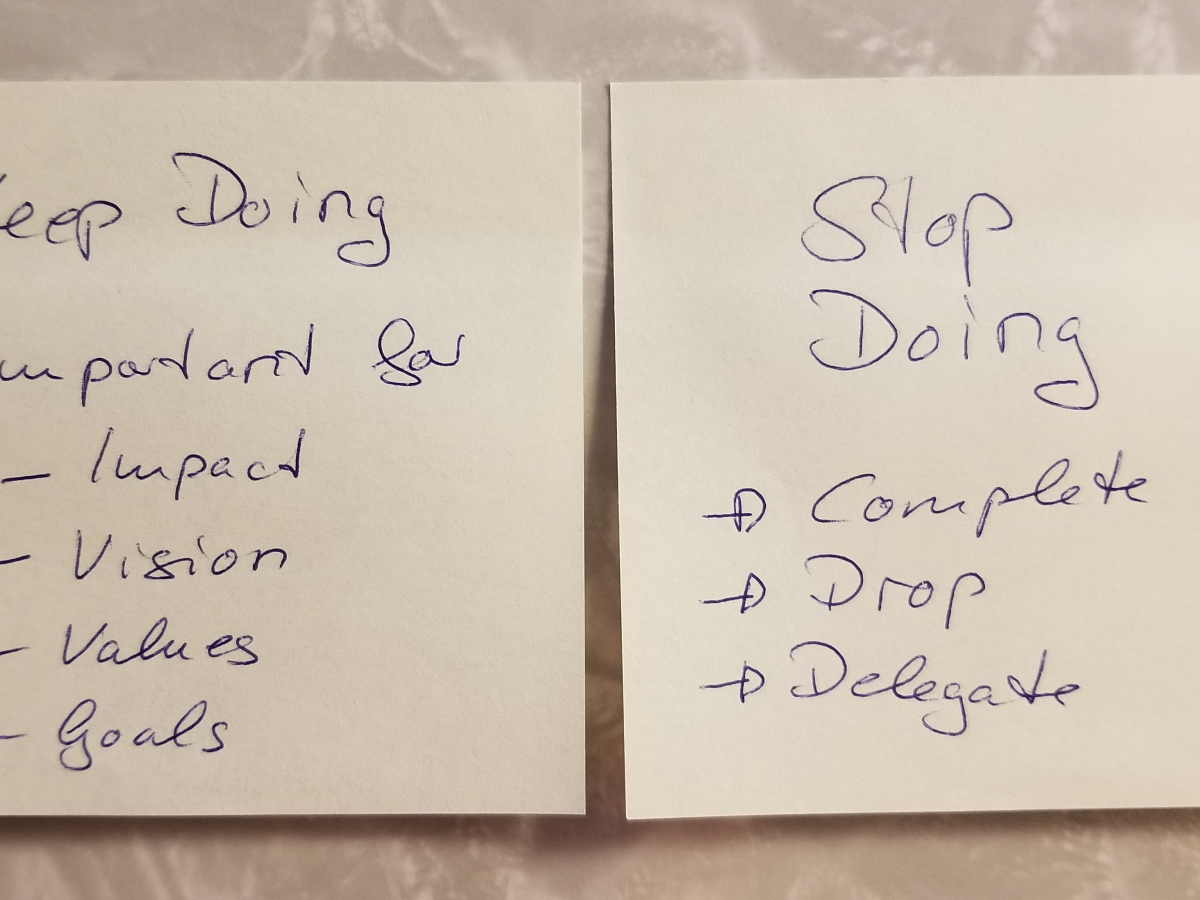Do you know that feeling of dissatisfaction with your day because you feel like you made no meaningful progress? That too many distractions got in the way of you focusing on deep work today. You may also know this vague feeling of failing because direction, strategy and what to prioritize are not crystal clear for you?
You want to read the latest book on product operations, or learn more about GenAI, and feel like those are topics you should focus on, but you never seem to find the time.
What many product leaders long for is time to focus. Time to reflect on what’s important, time to focus on the most important deep work topics, time to focus on their personal growth (I wrote a piece on that here) and their general ability to work on tasks with focus, presence and ease.
I asked my LinkedIn network in a poll last week what they name as the main contributing factor for their challenge with focus in a product role. There were two clear winners in the responses: 44% said “Knowing what to focus on” is their challenge and 50% said “Distractions” are the challenge for them. The other two options (“Remote work challenges” and “Other”) got very few votes. This comes after hearing many senior product leaders speak about focus as a challenge and frustration in the research interviews I’m currently doing with them.
Some tough love first:
There is exactly one person responsible for figuring out what to focus on, how to not stretch yourself too thin, how to deal with distractions and how to align your work with what’s important to you: That person is you!
It does not mean you have to do this alone. You can absolutely work with peers, your team, your manager, your coach, online resources, trainings and apps to create focus for yourself. But nobody other than you is responsible for creating your own focus. The good news is: you have a lot of agency here.
Finding and creating focus requires YOUR conscious and intentional choices FOR the things you want to focus on and AGAINST the things you do not wish to focus on. Yes, a great manager or coach might help you with this. But they will not be the ones making your daily choices on what meetings to attend, which project to spend how much time on, how you deal with distractions and how you take care of your own sense of fulfillment. Nobody can do this better than you, and nobody will know better than you what your most fulfilling choices and interests look like.
If you feel that focus is a challenge for you, YOU can choose to take action and make changes or YOU can choose to do nothing which keeps you exactly where you are with this. Doing nothing about this can feel like the easiest choice in a very busy role, but if you long for more focus read on for some strategies on how to create it for yourself.
Finally: If you’ve exhausted all tools and strategies within your control to gain focus and your context makes it impossible for you to focus, it is also YOU who can choose to look for a healthier and more nourishing place to contribute to.
Finding out what to focus on
This might be the hardest part in this, and also the most important one for you to be able to focus better. Without knowing what you want to focus on, there are no clear choices on what to say “yes” or “no” to. The beauty is: each of us is slightly different in what we value and what we enjoy. This creates the possibility of many different paths to a fulfilling life and to discovering what impact we genuinely want to create in the world.
The best way for me to figure out what I genuinely want to focus on, was an exploration into what is meaningful for me. What I personally value and where my joy is. The results of this inquiry will look different for each of us, but with a few targeted coaching conversations we can easily discover what our map for a fulfilling life consists of. From that place we can make choices that almost create focus on auto-pilot. It’s actually fun to work on things that hold meaning for you and you’ll find yourself easily making time for it as a result. Once you know what you truly want to say “yes” to, you can easily start giving that more priority in your life.
Now in the case of creating strategic focus in a product team you can follow a similar approach. You first look to discover a challenge worth solving for your users, then you start developing a vision for how life might look like for your users once that challenge is solved (your product vision), you look into what problems are worth solving from an economic or impact perspective (to incorporate your organization’s goals) and you start making a strategic action plan with smart bets on how to get there (your product strategy). It really helps to formalize vision, strategy and resulting goals by writing them down and sharing them widely so you can create alignment. That in turn creates the focus for you and your teams to work on the right strategic initiatives that get you closer to your vision. It’s also how you can explain to any stakeholder you aligned these with, what you are saying “no” to and why.
Your road to personal fulfillment can look very similar. You start by envisioning a life and future that feels amazing to you and then take smart strategic bets in your life (e.g. what jobs to take, what volunteer projects to contribute to, what to learn more about, what to start practicing) to help you get closer to the future life you desire to live. You can then choose to say “yes” to things that get you closer to that vision and “no” to choices that do not lead there.
For both your personal and professional choices it helps to regularly think about what you need to do next week to get just one step closer to the life and business goals you want to work towards. You can e.g. sit down on Fridays to make a plan with just 2-3 important things to achieve in the coming week. Block the time for this and stick to it. Even if you don’t finish those things next week, you’ll be a step closer to where you want to be. If you fail with onf of them, you have learnt about what path not to take, and you will be able to choose a better approach next week. For your professional goals: make your team your accountability partners in this by sharing your focus topics for the week with them.
Once you know what matters to you, you can steer your life in that direction.
Feeling stretched too thin across too many topics
A number of my clients feel overwhelmed and stretched too thin across many topics. And I get it, in a product role there are so many threads to combine into what success with a product looks like, that it can feel easy to take on everything and not say “no” enough. If you feel like your calendar is booked solid and you get more requests for your time than you can handle, it’s time to take a step back and choose the most important things to prioritize your focus around, and then also choose what you can delegate or stop doing.
When you consider what you can stop doing you could follow my template for how to go about this. Feeling stretched too thin usually means it’s time to say “no” more often. If saying “no” is hard for you, you can also try playing with my AI Product Leadership coach tool to brainstorm ways for saying “no” in a more effective way in your product leadership role.
Good reflection questions are: What is most critical to our team’s and our product’s success? Are there areas where I could delegate responsibilities (and ideally provide an opportunity for a team member to gain visibility and experience with a complex task)? How do my tasks align with my product vision and the strategic goals of my organization? The goal is to align your focus with where your contributions move the needle on where it matters the most and with what you want to say “yes” to.
This can also be an excellent conversation to have with your manager. Show them your proposal of what you want to focus on, where you’d like to stop doing something, and what you’d like to delegate, and then ask for their advice. You could ask “What might I be missing from a context you can see that I might be blind to?” It’s an excellent way to make them your collaborator in focusing only on the most important tasks, while making them feel heard and seen when making choices for what you won’t do. This way you can make sure your contributions also align with their and the organization’s priorities and goals.
Dealing with distractions
The second big topic that clearly surfaced in my research as a challenge to focus was “Distractions”. And this falls into two categories: The nature of your product leadership role and secondly how you are letting yourself get distracted.
First: Dealing with unplanned topics is part of the nature of your product leadership role. Your team will face surprising difficulties and come to you with hard decisions, there might be a new competitor in the market, or the loss of a major partnership might force you to adapt your strategy. Your team will also bring personal topics into your context: There will be conflicts, somebody’s career interests might not fit with your team, somebody may choose to leave and find a new challenge (requiring you to make time for hiring now). Team members will get sick, will ask for paternity or maternity leave, will need time for bereavement days or their honeymoon or may need to focus on their mental health in therapy and need a specific time in the week off. Life outside of work does not stop nor will it ever perfectly line up with your work agenda. These topics typically don’t come up as part of your plan for the week, and dealing with them can feel like a “distraction” from what you want to focus on. The truth is: Your team will look for your advice, mentoring, guidance, decisions and coaching with these topics. It’s simply smart to assume that these things will need time in your week. They’re not distractions (even if they feel like it), they are part of your job.
The other part is about how you let yourself get distracted. And this is about attention. It is about what you give focus and realizing fast if there is a gap between what you want to give focus and what you’re currently focusing on. For everyone who has a meditation practice, you will know this challenge. You sit with yourself and want to focus on one thing, and then you mind goes all over the place. The trick is to realize and then to patiently bring your attention back to what you want to focus on in that moment and start again. Mindfulness meditation a great practice for realizing and self-observing what you currently do and where your attention and focus is.
In the context of your product leadership role: It’s important first to get clear on what you want and need to focus on in your role. Then you can start watching what actually distracts you and re-focus on where you want to place your attention. This can mean:
- Turning off email notifications, social media notifications, slack notifications, your phone ring tone, etc… during times where you want to do focused deep work. Almost nothing is so urgent that it can’t wait for 2-3 hours while you’re finishing an important piece of deep thinking work.
- Realizing when you feel the urge to engage with social media or scrolling on your phone and consciously doing something different. You can then interrupt that pattern by e.g. getting up and stretching, doing a few squats, walking to the bathroom, getting yourself a cup of tea and then refocusing on what is truly important in that moment. We all need breaks when doing deep thinking work, that “urge to check email or social media” might just come at a time where you start to feel tired and need a short break from what you want to be focused on.
- Pay attention to what kinds of important tasks you struggle to start doing and regularly procrastinate on. Then making time for them first thing in the morning before you get into your emails or read what’s new on slack. When you have made meaningful progress with that one thing in the first part of your day, you will feel better about what you have accomplished by the end of the day. If you can, always plan for your deep work topics for times where you are relatively rested. For most of us that is first thing in the morning. When you are rested, you are better able to focus and think and less vulnerable to other topics taking your attention away from the most important thing to make progress with that day.
- Keep a shared document with people you regularly interact with. Agree that both of you will collect conversation topics that you want to touch on and that are not urgent to have right in this moment. This clears your (and their) mind in the moment the topic comes to your attention and allows you to return your focus to what you need to do in that moment. Doing this lets you trust that you won’t forget these topics until your next 1:1 or otherwise regularly recurring meeting. It means not cluttering your day with small interactions that can be pooled into a regular focused conversation.
And most importantly: Keep paying attention to what triggers distractions for you. Based on that you can develop strategies that help you make different choices. Don’t be too hard on yourself. Mind-wandering is a feature of our brain, and our ability to focus is something that can be learnt and practiced over time. A great book on this topic is “Peak Mind” by Dr. Amishi Jha who looks at the topic of focus from a neuro-science perspective.
Your values and purpose matter
Coming back to that pesky challenge of “Knowing what to focus on” from my poll: there is a relationship between your personal values and purpose and your ease with identifying what to focus on. When your job and your personal values and purpose align, any operational task that is connected to this, will make you feel like you made meaningful progress towards something that matters to you. It is no accident that two contributing factors to high performing teams are “Meaning: Work is personally important to team members” and “Impact: Team members think their work matters and creates change”.
If however you are working on things that lack a connection to what is personally important to you, any small detour from the plan, any interruption, any extra challenge can feel like an undue burden or “distraction” to you. It’s like they get magnified because you never cared about the meaning and impact of your work to begin with. The dangerous thing about playing in that arena is that this is a fast route to burnout.
Your initial irritation with things, especially when many things in your role irritate you, might be a symptom of a lack of alignment between what you’re doing professionally and what matters to you as a person. Becoming aware of that opens opportunities of choice for you: You might be able to craft your role in a direction of better alignment, or you might find this as the starting point of a transition to something new. Of course we may temporarily and intentionally stay in those imperfectly aligned places. They may come with a learning opportunity, they may pay very well, but ultimately, they will never feel as fulfilling and energizing as contributing in a context that holds meaning for you. And I can only encourage you to seek a better alignment for yourself and your team members. The same is true for each of your team members. Having those conversations about what people want out of their time in your team and with your organization are powerful tools in finding focus and alignment and lead to creating more successful outcomes.
If you don’t know how to get started with this, or if you could use an extra dose of clarity on your values and purpose, here is an offer for you: A mini coaching engagement of only two sessions: One on values, one on life purpose. Type “Values and purpose coaching – EUR 250 package” into the signup box on my Calendly to take advantage of this. If you go through these two sessions and don’t find the results insightful, I’ll refund your money no questions asked. This is a 50% discount on my regular coaching pricing. I’m gifting this to you because this is work I love doing, the kind of work that energizes me. I feel strongly that everyone deserves to find more clarity on what they truly want in life. Your focus will come from there!
There will also be another free Product Salon event themed around this topic that I’ll host on March 4th at 6pm CET. Details about this can be found here: https://www.linkedin.com/events/productsalon-masteringfocus-str7165732983394574336/
___________________________
If you would like to explore this more: reach out for the mini coaching package with me.
I coach, speak, do workshops and blog about #leadership, #product leadership, #AIEthics #innovation, the #importance of creating a culture of belonging and how to succeed with your #hybrid or #remote teams.
Get my latest blog posts delivered directly to your inbox.
Your email address will only be used for receiving emails with my latest blog posts in them. You can unsubscribe at any point in time.
If you enjoyed reading this post, you may enjoy the following posts as well:
Product Strategy without clear Business Strategy
This post is for you, if you find yourself in an organization that lacks a clear business strategy. Something I can relate to from many years of working with these kinds of organizations. It’s also for you if you just want to reflect and think about how to improve your current strategy with a few…
Evolving as a Product Leader: Skills and Strategies
We would all love it, if we could simply be great at product, or at leadership, or at public speaking, or an expert on AI, or great at discovering and phrasing vision and strategy or super focused or finally find a healthy work-life balance. We admire those people who have mastered a skill we’d like…
The Power of Completion
We each have only a few hours of time to be productive with work each day. Managing our time wisely, being intentional about what we give priority (and what we decide not to do) is a key skill in product work and in life. When I was working in product roles, it always felt like…
Why inclusivity matters
Looking at the world today one thing is clear to me: violence does not nurture peace. And the only way to come together as a human family is to patiently do the work of building inclusive spaces. Spaces that allow all of us to exist, that come with fair access to opportunities, that make us…
The art of persuasion
Persuasion is about influence. It is a super useful skill to invite your team to co-create with you. So often in product roles, this is exactly what we could use more of. Persuasion skills could help you to be able to agree on a strategy, or to get to alignment on our OKRs or the…
Vulnerability – a key skill for product leaders
It takes a healthy dose of courage and self-awareness to be ok with vulnerability. To become aware of how it affects your relationships and to start consciously using it to improve your working relationships. It took me quite a few loops to become aware, start experimenting with it and start learning how vulnerability turns into…






